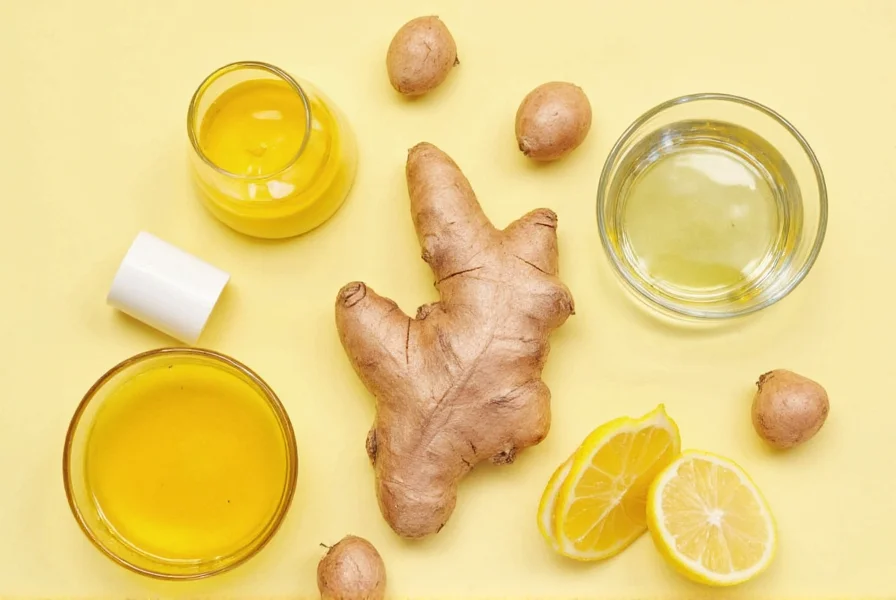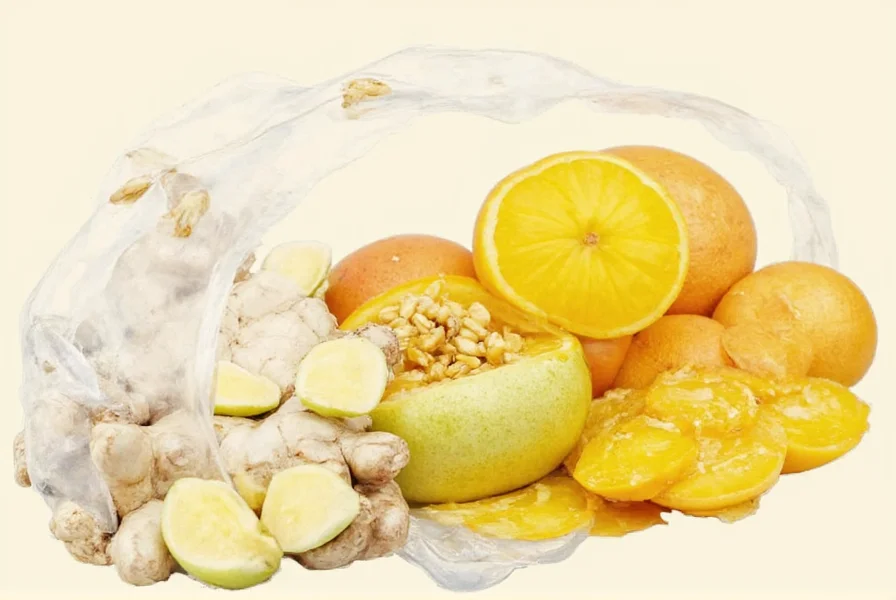When examining whether ginger qualifies as an acid, we need to distinguish between chemical classification and pH measurement. In chemistry, an acid is a substance that donates hydrogen ions (H⁺) in solution. Ginger doesn't fit this strict definition as a pure acid compound. However, like most plant materials, ginger does have a measurable pH level that falls on the mildly acidic side of the pH scale.
Understanding pH and Acidity in Foods
The pH scale measures how acidic or alkaline a substance is, ranging from 0 (highly acidic) to 14 (highly alkaline), with 7 being neutral. Most fresh foods fall somewhere between 3-7 on this scale. For reference:
| Food/Beverage | Typical pH Range |
|---|---|
| Lemon juice | 2.0-2.6 |
| Vinegar | 2.5-3.5 |
| Orange juice | 3.3-4.2 |
| Fresh ginger | 5.6-5.9 |
| Water | 7.0 |
This table shows where ginger falls in comparison to other common foods. While technically acidic (anything below 7), ginger's pH is significantly less acidic than citrus fruits or vinegar.
Ginger's Chemical Composition
Ginger root (Zingiber officinale) contains over 400 different compounds, including:
- Gingerols (the primary bioactive compounds)
- Shogaols
- Zingerone
- Volatile oils
- Dietary fiber
- Various minerals
None of these are strong acids, though some components may have weak acidic properties. The mild acidity of ginger primarily comes from organic acids naturally present in the plant tissue.

Ginger and Digestive Acidity
Many people wonder does ginger increase stomach acid because they're concerned about acid reflux or GERD. Research suggests ginger may actually help regulate digestion rather than increase acidity:
- Ginger appears to accelerate gastric emptying, which can reduce pressure that contributes to reflux
- Studies indicate ginger may protect the stomach lining from acid damage
- Gingerols have anti-inflammatory properties that may soothe digestive tract irritation
A 2021 review published in the Journal of Gastroenterology and Hepatology found that ginger supplementation showed potential benefits for functional dyspepsia without increasing acid production. However, individual responses vary, and some people with sensitive digestive systems might experience discomfort.
Common Misconceptions About Ginger and Acidity
Several factors contribute to the confusion around is ginger acidic or alkaline:
- Taste association: People often equate sour taste with acidity, but ginger's pungency comes from gingerols, not acid content
- Post-digestive effects: Some believe foods affect body pH after digestion, but the body tightly regulates blood pH regardless of food intake
- Supplement forms: Ginger supplements or processed ginger products may have different pH levels than fresh ginger
Practical Considerations for Digestive Health
If you're concerned about is ginger good for acid reflux, consider these evidence-based points:
- Fresh ginger typically causes fewer issues than dried or powdered forms, which may contain higher concentrations of active compounds
- Consuming ginger with food rather than on an empty stomach may reduce potential irritation
- A typical serving size (about 1-1.5 grams of fresh ginger) is unlikely to trigger reflux in most people
- Individual tolerance varies significantly—some people with GERD find ginger soothing while others experience discomfort

When Ginger Might Affect Acid-Related Conditions
While ginger generally doesn't increase stomach acid production, certain situations warrant caution:
- High doses: Consuming large amounts of ginger (more than 4 grams daily) might irritate some sensitive digestive systems
- Pre-existing conditions: People with severe GERD or peptic ulcers should consult a healthcare provider before using ginger medicinally
- Medication interactions: Ginger may interact with blood thinners and diabetes medications, though this isn't directly related to acidity
Research published in the European Journal of Gastroenterology & Hepatology suggests that moderate ginger consumption is generally well-tolerated, with only about 2-5% of participants reporting mild digestive discomfort in clinical trials.
Final Assessment on Ginger's Acidity Profile
To clarify the original question is ginger an acid: Ginger is not chemically classified as an acid, but it has a mildly acidic pH. Its effects on digestive acidity are complex—while the root itself measures as slightly acidic, it doesn't necessarily increase stomach acid production and may actually support healthy digestion for most people.
When evaluating whether can ginger cause heartburn, the evidence suggests it's unlikely for moderate consumption in most individuals. However, as with any food, individual responses vary, and those with severe acid-related conditions should monitor their personal tolerance.
What is the pH level of fresh ginger?
Fresh ginger typically has a pH level between 5.6 and 5.9, which classifies it as mildly acidic on the pH scale (where 7 is neutral). This is significantly less acidic than citrus fruits or vinegar, placing ginger closer to neutral than strongly acidic foods.
Does ginger increase stomach acid production?
Current research suggests ginger does not increase stomach acid production. Studies indicate it may actually help regulate digestion by accelerating gastric emptying and protecting the stomach lining. However, individual responses vary, and some people with sensitive digestive systems might experience discomfort with high ginger consumption.
Is ginger safe for people with acid reflux?
Most people with mild acid reflux can safely consume moderate amounts of fresh ginger (about 1-1.5 grams). Ginger may even help soothe digestive discomfort for some individuals. However, those with severe GERD should consult their healthcare provider, as individual tolerance varies. Consuming ginger with food rather than on an empty stomach typically reduces potential irritation.
Why do some people think ginger is highly acidic?
This misconception likely comes from confusing taste properties with actual pH measurements. Ginger's pungent, spicy flavor comes from gingerols, not acidity. Additionally, some people mistakenly believe that foods affecting digestion must alter stomach pH, when in reality the body maintains tight control over gastric acid levels regardless of food intake.
How does dried ginger compare to fresh ginger in terms of acidity?
Dried ginger powder typically has a slightly lower pH (more acidic) than fresh ginger, usually around 5.3-5.6, due to concentration of compounds during the drying process. This means dried ginger may be more likely to cause digestive discomfort in sensitive individuals compared to fresh ginger, though both remain only mildly acidic compared to other common foods.











 浙公网安备
33010002000092号
浙公网安备
33010002000092号 浙B2-20120091-4
浙B2-20120091-4